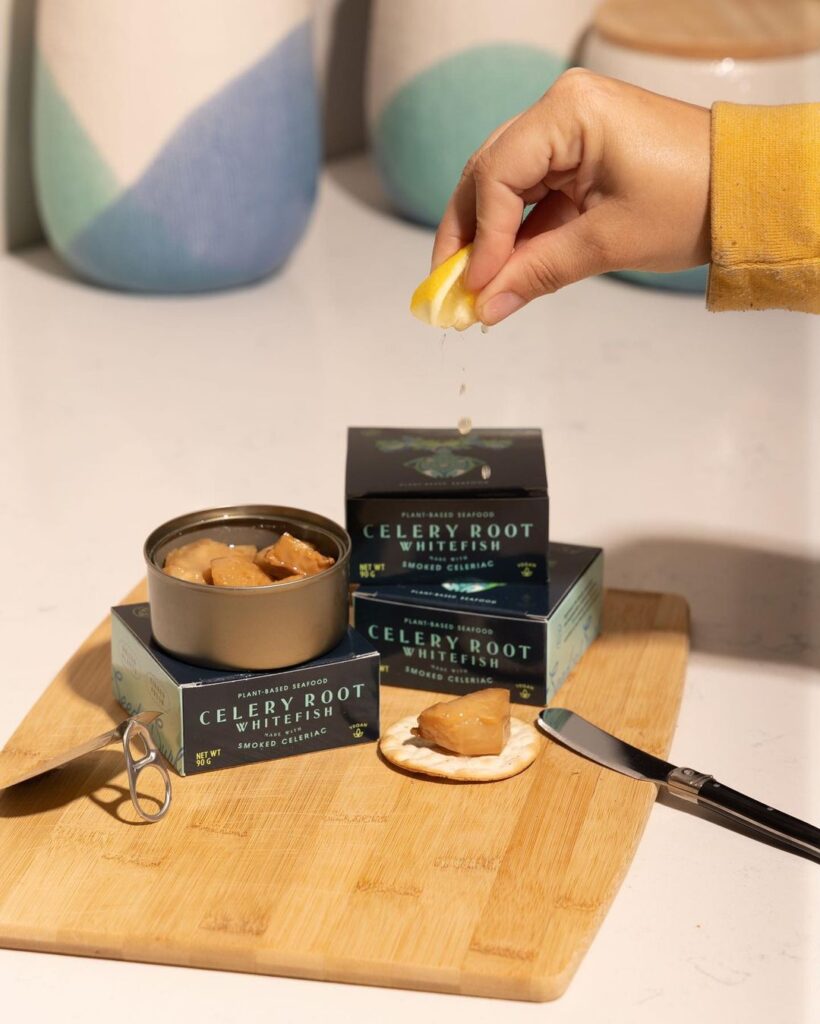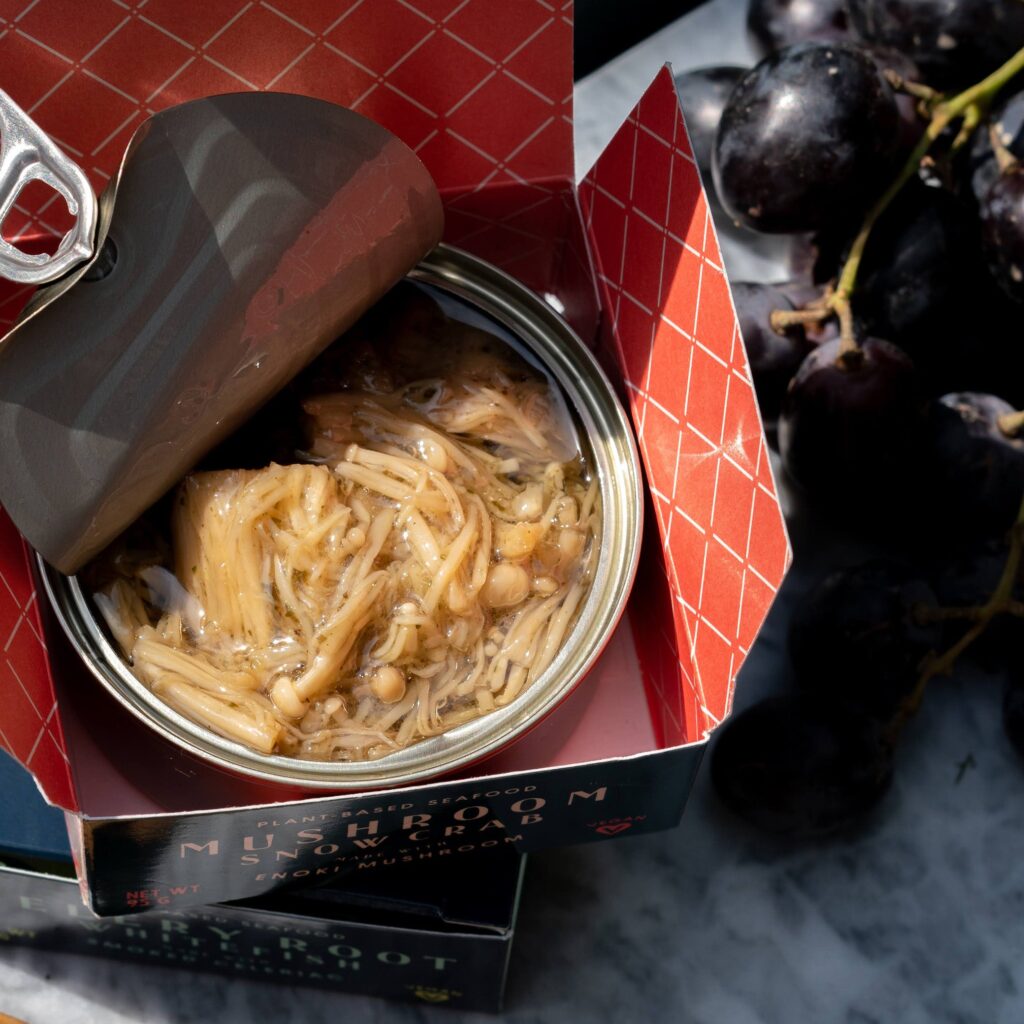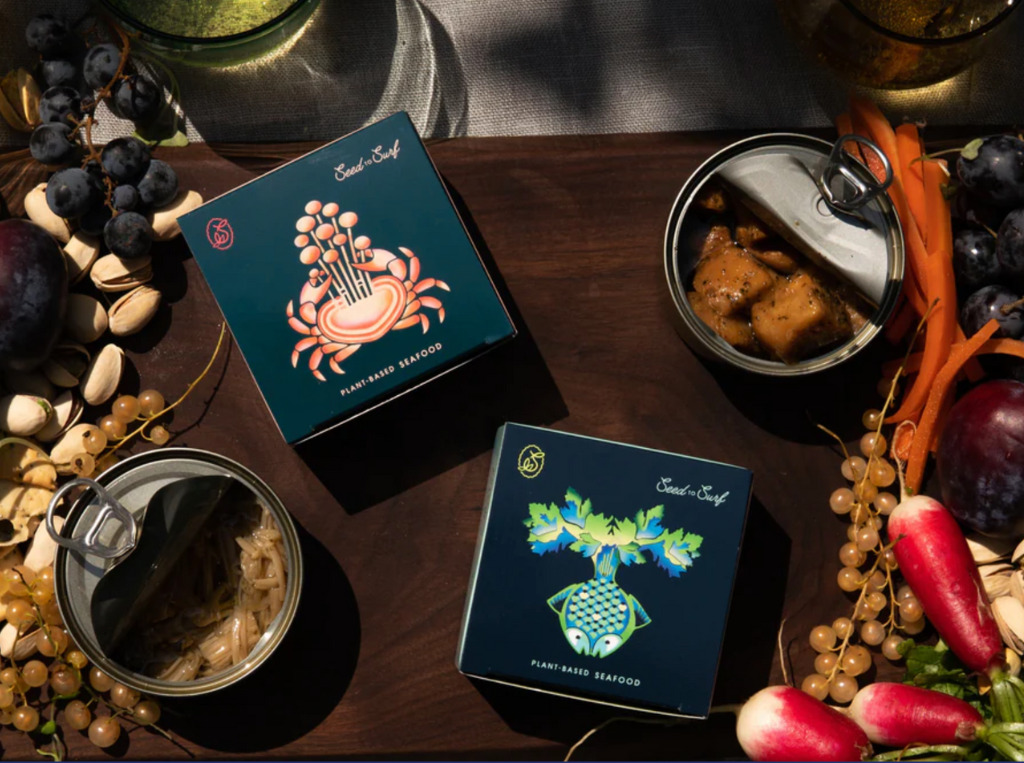This Startup Makes Whole-Food Plant-Based Snow Crab & Whitefish from Vegetables
4 Mins Read
In what is a burgeoning plant-based category, vegan seafood undergoes a whole-food twist with Canadian startup Seed to Surf, which uses vegetables as its primary ingredient. Founded in 2020, the brand makes tinned snow crab and smoked whitefish from mushrooms and celeriac root in a clean-label formulation responding to consumer trends.
A global consumer survey by Ingredion last year revealed that more than half of consumers find it important for products to have a short ingredient list, with 71% willing to pay more for brands people are willing to pay more for brands reformulating to cleaner labels and natural claims. Further research showed that nearly half (46%) would pay 20-30% more for such products.
The value of clean-label food is higher than ever. And it’s that mindset that Seed to Sturf aims to tap into with its whole-vegetable alt-seafood. The company’s snow crab is made from enoki mushrooms and smoked whitefish from celeriac root, with the aim to “celebrate vegetables for what they are”. It eschews high-moisture extrusion and shear cell tech – commonly used in alt-meat processing – and instead works with plants in their natural setting to create its whole-food plant-based products.
Championing vegetables for vegan ‘seafood with roots’

The brand has worked with food scientists to develop its products’ seafood flavours, and the vegetables are said to be cooked using retort technology, a process that uses heat and pressure to extend shelf life, during the canning process. The products only contain six or fewer ingredients – the vegetables are paired with sunflower oil, sea salt, seaweed (kombu and kelp) and natural flavourings, while the celeriac root whitefish also has lactic acid. It means the products are also gluten-free and allergen-friendly, which is a big win for a plant-based meat alternative.
The snow crab is described as tender, savoury and sweet, while the smoked whitefish is said to be smoky, flaky and packed with umami. The company says preserving and preparing whole vegetables “can offer intriguing new takes on the premium tinned seafood you’d find at top restaurants and high-end grocers”, while the inning aids a shelf-stable, low-energy storage option and recyclable packaging to boot.
“We found that these two vegetables really took on and enhanced that seafood experience that people might know well,” Seed to Surf co-founder Alexandra Bergquist told FoodNavigator. “Our mushroom crab is amazing in a crab dip, while the smoked whitefish is great on a bagel. [Consumers] should try these products in the best way possible. [It’s] setting them up for success.”
A rapidly evolving alt-seafood sector

Industry think tank the Good Food Institute reported a 40% year-on-year increase in pound sales for plant-based seafood in 2022. And as of 2021, there were over 120 companies in the alternative seafood space (which includes vegan, fermentation-based and cultivated seafood).
Seed to Surf is joined by a host of other brands making vegan alternatives to seafood, which is an industry rife with environmental and human rights issues. The growing demand for seafood has led to overfishing, which, in turn, means higher greenhouse gas emissions, while the heavy fuel use by ocean fishery vessels also contributes to the climate crisis. The 2021 documentary Seaspiracy details the endemic issues attached to this sector.
“The average consumer is becoming more aware of animal welfare and sustainability,” Maarten Garaets, alt-protein managing director of seafood giant Thai Union, told Green Queen in May. “And this is becoming a more important part of the selection criteria when they are buying food, but this is still a very small group.”
He added: “Alternative seafood is a new category, with limited awareness, whereas meat is more established. However, seafood is bound to catch up soon. Health is less of a concern for seafood, whereas sustainability will be more of a lever.”
Earlier this month, South Korean brand Unlimeat launched its plant-based tuna alternative, while startups like Konscious Foods and Hooked Foods have all received funding this year, and two European brands received a €1.5M grant to create 3D-printed mycoprotein to replace seafood.



